|
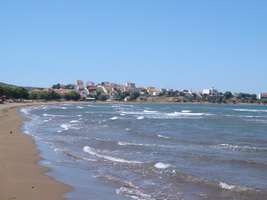 Gavatha is a tiny fishing
port at the end of a lush plain between
several mountains. There is nowhere to stay in
the village itself and Mary is beginning to
lose her composure. We send her into the
Paradise Hotel to get information and she
comes out in a frustrated panic because there
is only one available room which means she
will have to "share her space" with us. This
idea horrifies her. It puzzles me because
Andrea and I have been on our best behavior.
We haven't had one argument or extended period
of bickering. Mary is just having trouble
dealing with the normal setbacks and
tribulations of Greek island group travel. As
far as I'm concerned once we rented the car,
everything was fine. I don't care where we
stay. I'd just as soon drive twenty-four hours
a day, taking little catnaps when I can. But Mary, with our
first failed attempt at finding a room has
given in to despair. We try several other
places but none are suitable. While the girls
are ready to move on to Sigri, forty-five
minutes away, I want to check the other side
of the valley where all the farms are. We
drive through the winding dirt roads and find
two remote tavernas right next to each other.
At the first one a young man who's name is
Kosta, directs us to a shack, at the end of a
paved over riverbed that is serving as a road
in the dry season. It is owned by an old man
named Apostolis who has given up on his
attempt to run a beach side ouzerie because
there are no customers. He has two rooms next
to his house. He charges five thousand dracs for the
pair and we take them.
Gavatha is a tiny fishing
port at the end of a lush plain between
several mountains. There is nowhere to stay in
the village itself and Mary is beginning to
lose her composure. We send her into the
Paradise Hotel to get information and she
comes out in a frustrated panic because there
is only one available room which means she
will have to "share her space" with us. This
idea horrifies her. It puzzles me because
Andrea and I have been on our best behavior.
We haven't had one argument or extended period
of bickering. Mary is just having trouble
dealing with the normal setbacks and
tribulations of Greek island group travel. As
far as I'm concerned once we rented the car,
everything was fine. I don't care where we
stay. I'd just as soon drive twenty-four hours
a day, taking little catnaps when I can. But Mary, with our
first failed attempt at finding a room has
given in to despair. We try several other
places but none are suitable. While the girls
are ready to move on to Sigri, forty-five
minutes away, I want to check the other side
of the valley where all the farms are. We
drive through the winding dirt roads and find
two remote tavernas right next to each other.
At the first one a young man who's name is
Kosta, directs us to a shack, at the end of a
paved over riverbed that is serving as a road
in the dry season. It is owned by an old man
named Apostolis who has given up on his
attempt to run a beach side ouzerie because
there are no customers. He has two rooms next
to his house. He charges five thousand dracs for the
pair and we take them.
|
|
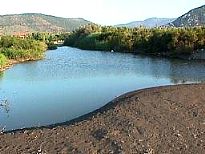 The rooms are in a cinder block shack
in the middle of his garden. I can see and
hear the sea from the small front porch. There
is a river nearby, or what is probably a river
in the rainy season. In the summer it is
several small pools full of frogs and if our
landlord is telling us the truth, eels, which
people come to catch and eat.
The rooms are in a cinder block shack
in the middle of his garden. I can see and
hear the sea from the small front porch. There
is a river nearby, or what is probably a river
in the rainy season. In the summer it is
several small pools full of frogs and if our
landlord is telling us the truth, eels, which
people come to catch and eat.
"The frogs", he
says, "keep the mosquito population down."
This may be true. I haven't been bitten yet.
Apostoli wants to sell the ouzerie for about
twenty-five thousand dollars. His kids hate it
here and are angry that he opened the place.
They never visit. He gives me the lowdown and
the grand tour of the property hoping I'll buy
it. Maybe we'll get it for Andrea's mom.
The best thing about this
place they call Campo, which means valley, is
the taverna where we got directions. We go
there to have an ouzo and to wait for a call
from Pamela in New York. We end up staying
there all night eating these incredible fresh
sardines that are grilled, then served with
lemon and oil. As we eat, the restaurant
begins to fill up with Greek Americans and
Canadians who are back for the summer. I speak
with three teenage girls from Toronto and
Vancouver who are on their way to the village
of Antissa, fifteen kilometers away, where
there are two bars. For the young people that
is the extent of the night life in the area.
I'm surprised there is any nightlife at all
for them. The tavernas here were a surprise to
me and the fact that this one was so good is a
gift from God. I feel like we have stumbled
upon another wonderful place and with the
flexibility the car gives us I'll be happy to
stay here if not indefinitely, at least
another night.
|
Campo Antissa (from
In Search of Sardeles Pastes)
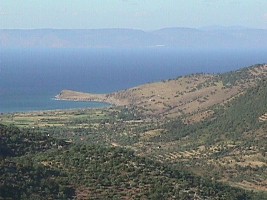 The girls are going to Ann's for lunch. I
forsee an afternoon of chatting about the
tiles in Pam's bathroom and the dreaded
ceramic icons with the cracking paint so I let
them know that I plan to venture out alone.
Andrea wants to come but there is no way that
Pam can bring Amarandi back on her motorbike
unless she is sandwiched in between them. I
say good-bye in the lower platia of Vatousa
and jump into the car. For the next few hours
I am free.
The girls are going to Ann's for lunch. I
forsee an afternoon of chatting about the
tiles in Pam's bathroom and the dreaded
ceramic icons with the cracking paint so I let
them know that I plan to venture out alone.
Andrea wants to come but there is no way that
Pam can bring Amarandi back on her motorbike
unless she is sandwiched in between them. I
say good-bye in the lower platia of Vatousa
and jump into the car. For the next few hours
I am free.
With half a tank of gas and a pocket full of
drachma there's nowhere I can't go with the
exception of Eressos or Sigri since that is
where Andrea wanted to go. But I head in that
direction anyway and turn off the road at the
Monastery of the Perivoli, which is a fancy
word for garden. I drive down the mountain to
a fertile little valley and pull into a big
yard outside the walls of the monastery. There
is an old man sitting at the gate and he shows
me around. He's the caretaker. There are no
monks there anymore but I can't understand
why. The place is heaven on earth with a small
chapel and the monks former home enclosed by a
big wall. Also within the wall is a beautiful
garden that has been kept up. The old man
gives me the grande tour of the church which
is painted from top to bottom with murals that
are now faded and difficult to see. He
carefully points out each scene and explains
the significance of which I understand about
half of. I'm more interested in him. Is this
his job? Can I take his place when he retires?
There is a big panagiri on November
twenty-first when the church and the yard
outside it's walls fill with people. As I am
leaving I wonder if it's customary to tip in
this situation. I don't want to take the
chance of insulting him by asking but I leave
two hundred drachs on the bench where he had
been sitting when I drove up. If he doesn't
realize it's from me maybe he will think it's
from God.
There is a dirt road
that runs parallel to the beach in the fertile
valley of Campo Antissa. Where it connects
with the paved riverbed that serves as the
road to the beach are two small tavernas, both
shaded by grape vines and fruit and nut trees.
It was last summer that we came to this quiet
place and ate the best grilled sardines of our
lives. As we ate, the restaurant gradually
filled up with Greek/Americans who were
returning to their village for the summer,
though it's not really a village, but a
collection of small farms. Now in mid
September they have all gone home. In the
restaurant across the street the only customer
is the man who delivers the Tsekeli Brand ouzo
while I am the lone customer here. This could
be the quietest spot on earth. But it's not.
Because of the elections, televisions in both
restaurants are on full blast as candidates
try to get their points across to an audience
they can't see. Occasionally I hear the tweet
of a bird, in the short silence between
one important point and the next. The
commercials are full of patriotic music and
slogans about the future and destiny of a
country that wants desperately to be a part of
Europe but is probably better off as the
leader of a united Balkans.
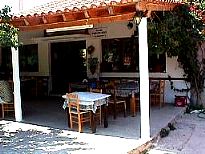 I ask the woman who is glued to her television
if she has sardines. She nods her head which
unfortunately in Greece means no. She does
have salpa and tomato salad and rather then
insult her by leaving I order one, not knowing
if it's the size of an anchovy or a marlin. It
sounds like there is more action across they
way and I momentarily regret my weakness and
wish I had gone there instead, especially
because she acts as if I have interrupted her
while doing something important, but by the
time the fish comes she is friendly and all
smiles. Plus the fish is delicious and the
perfect meal for me and her cat. I ask if she
remembers me and she says she does but I can
tell she thinks I am someone else when she
asks me how things are at the gas station. At
least she thinks I am Greek which is a
compliment to my ability to order food. I
finish my fish and I am happy. Satisfied with
my meal and feeling that by eating here I have
done some kind of research since we were
planning on coming back here tonight for a
dinner of grilled sardines and now I know they
don't have any.
I ask the woman who is glued to her television
if she has sardines. She nods her head which
unfortunately in Greece means no. She does
have salpa and tomato salad and rather then
insult her by leaving I order one, not knowing
if it's the size of an anchovy or a marlin. It
sounds like there is more action across they
way and I momentarily regret my weakness and
wish I had gone there instead, especially
because she acts as if I have interrupted her
while doing something important, but by the
time the fish comes she is friendly and all
smiles. Plus the fish is delicious and the
perfect meal for me and her cat. I ask if she
remembers me and she says she does but I can
tell she thinks I am someone else when she
asks me how things are at the gas station. At
least she thinks I am Greek which is a
compliment to my ability to order food. I
finish my fish and I am happy. Satisfied with
my meal and feeling that by eating here I have
done some kind of research since we were
planning on coming back here tonight for a
dinner of grilled sardines and now I know they
don't have any.
I hear thunder
approaching and get up to pay. I'm a little
apprehensive about the cost of the fish but
she only charges me a thousand drachs for the
entire meal, less then four dollars. I thank
her and get her phone number so we can call
and ask if they have sardines. Her son Kosta,
remembers me from last year, especially when I
tell him that he had made the best grilled
sardines not only on the island, but in the
whole world. "Ahh.., now I remember you," he
laughs, remembering our sardine orgy of last
summer. "Call us", he says. "For sure we will
have some this week."
It's music to my
ears.
With the first few
drops of rain falling I drive down the paved
ravine to the beach. I don't want to stay long
because in an hour the road could be a river
as the water pours down the mountains and
empties into this channel to the sea. I stop
by the shack of the old man who rented rooms
to us last year. He's trying to sell some land
around it along with the building itself which
he has been running unsuccessfully as a beach
ouzerie-cafeneon. To me it looks like paradise
and I wonder if he's raised his price since
last year. I envision a tiny music-cafeneon,
serving wine, beer, ouzo and snacks cooked by
my mother and mother-in-law, while every night
I entertain the customers, singing my songs
while occasionally bringing in a special guest
star. I imagine this really hip folk club in
the most remote beach on the island, where sea
meets swamp, music echoing through the reeds
and across the sea to the coast of Turkey. A
few posters scattered around and it could be
the hottest spot in Lesvos. And there's plenty
of free parking.
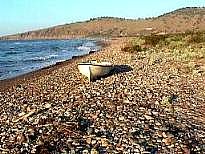 I walk down to the beach where the drops are
beginning to show on the water and the coast
of Turkey is fading into the mist. I can't
really tell which way the clouds are moving
but it looks like it must be raining like hell
in Vatousa. I wonder how the girls will get
back to Xidera. There is a fisherman's net
stretching out from the beach in a zig-zag
pattern about fifty meters off shore. I walk
over to the pond that has formed where the
riverbed ends and the beach begins. As I walk
along the shore hundreds of tiny frogs jump
into the water. I assume they are frogs. I
never actually see anything except the
continuous little splashes as I pass. A
fisherman drives up in a pick-up truck and
drags his rowboat further from the water and
then to make sure, ties it to a pole. He's
expecting heavy weather and he's right. In a
few minutes it is pouring rain and I'm
learning how to work the windshield wipers of
the Puegeot. It's not long before I have
mastered them and am happily driving to the
sea-side village of Gavatha. The pavement ends
abruptly and the entrance to the village is a
sea of mud, but the harbor is very scenic and
the fishing boats look lovely in the rain. I
watch them for awhile but I can't get the
thought of Amarandi, Andrea and Pam driving
home through the downpour on her little papaki
motorbike, out of my head. The battle between
inner peace and guilt is over quickly and I
drive the now hazardous mountain road to
Vatousa where I search in vain for Anna's
house. By the time I get back to the car I am
as wet as they would be on the motorbike. I
drive back to Xidera and spend half an hour
looking for a clever place to park the car. I
end up in the exact same spot I had so much
trouble getting out of the first day. At least
now I have experience.
I walk down to the beach where the drops are
beginning to show on the water and the coast
of Turkey is fading into the mist. I can't
really tell which way the clouds are moving
but it looks like it must be raining like hell
in Vatousa. I wonder how the girls will get
back to Xidera. There is a fisherman's net
stretching out from the beach in a zig-zag
pattern about fifty meters off shore. I walk
over to the pond that has formed where the
riverbed ends and the beach begins. As I walk
along the shore hundreds of tiny frogs jump
into the water. I assume they are frogs. I
never actually see anything except the
continuous little splashes as I pass. A
fisherman drives up in a pick-up truck and
drags his rowboat further from the water and
then to make sure, ties it to a pole. He's
expecting heavy weather and he's right. In a
few minutes it is pouring rain and I'm
learning how to work the windshield wipers of
the Puegeot. It's not long before I have
mastered them and am happily driving to the
sea-side village of Gavatha. The pavement ends
abruptly and the entrance to the village is a
sea of mud, but the harbor is very scenic and
the fishing boats look lovely in the rain. I
watch them for awhile but I can't get the
thought of Amarandi, Andrea and Pam driving
home through the downpour on her little papaki
motorbike, out of my head. The battle between
inner peace and guilt is over quickly and I
drive the now hazardous mountain road to
Vatousa where I search in vain for Anna's
house. By the time I get back to the car I am
as wet as they would be on the motorbike. I
drive back to Xidera and spend half an hour
looking for a clever place to park the car. I
end up in the exact same spot I had so much
trouble getting out of the first day. At least
now I have experience.
The girls arrive at
the house five minutes after me, all soaking
wet except Amarandi in her lime green
waterproof wind breaker. The rain continues to
fall until the late afternoon when the sky
clears and a rainbow appears. It's Amarandi's
first.
Liota(from
In Search of Sardeles Pastes)
We turn
on to the dirt road that leads to Liotta. We
drive through the village and run smack into a
herd of sheep who panic and turn down the
wrong road. The woman shepherdess has to run
after them and bring them back. She looks
annoyed. We continue but come to a dead end.
We backtrack and take another branch in the
road but this one leads up a mountain and gets
so bad that I make Andrea and Pam get out of
the car so I can back down the mountain
without tearing off the muffler. We change our
plans and stop in the platia of the village.
There is a spring in the square with sweet
water pouring out. I go to look at the church.
It's ancient and full of old icons. The girls
make their crosses and kiss their favorite
images while I sit on the hill behind the
church that has a view of the entire valley. I
am amazed at how green it is. I feel like I am
in the Smokey Mountains. The view of Gavatha,
the sea and the valley beneath us is
breathtaking. Most of the houses are in ruins,
waiting for foreigners to snatch them up and
restore so they can live in this quiet little
village for two weeks every summer.
When we go back to the
platia we meet a woman who lives in the
village who tells us the history of the church
and the holy spring. In the tenth century the
daughter of a king in Anatolia developed
leprosy. Her father sent her away in a boat
and she came here. When she walked to this
spot she saw some pigs that even though they
were rolling in the mud from the spring, they
didn't get dirty. She thought that perhaps
this was a magical spring so she too rolled in
the mud. She was instantly cured and built
this church. It was over a thousand years
old.
As amazing is the platanos
tree that shades the platia. It's base was the
size of a giant California Redwood. The woman
tells us that according to the records from
Molyvos, the tree is also a thousand years
old.
The woman invites us
to her house for coffee but I elect to stay by
myself in the square and enjoy the
tranquility. Leaves from the old tree have
fallen into the waters of the spring and it
suddenly looks and feels like autumn. I am
relaxed and at peace, until I hear Amarandi
crying from the woman's house. An old man
walks up leading his donkey and sees me at the
fountain. My presence takes him by surprise
and he asks me who I am and what I am doing
here.
I tell him I am from
Xidera.
"But why do you speak like
that?" he asks me.
I admit that I am American
and to my relief he doesn't talk about
Clinton's love for Turkey, which is the topic
of conversation this summer. He tells me that
everyone has left the village except for a few
families. Now some Germans have bought the
ruins and restored them. He points at a
monstrosity of a house with enormous windows
that looks as out of place as a Coney Island
hot-dog stand.
"Malakas", he snorts and
walks off.
I return to my
contemplation, half expecting him to come back
and continue the conversation, but he never
does and eventually the girls return and we
drive the winding roads back to Xidera.
Return
to Antissa
|